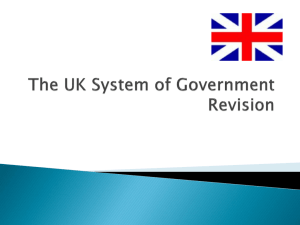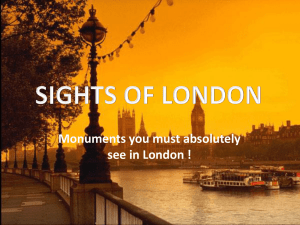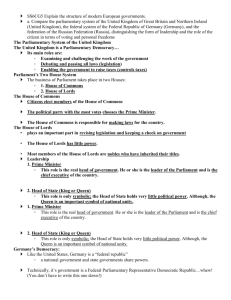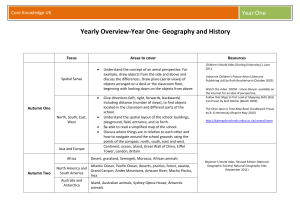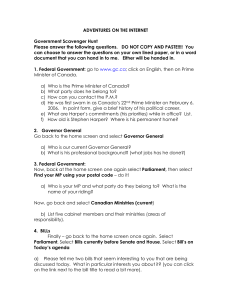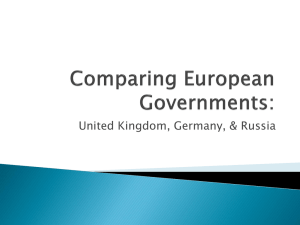European Convention on Human Rights.
advertisement
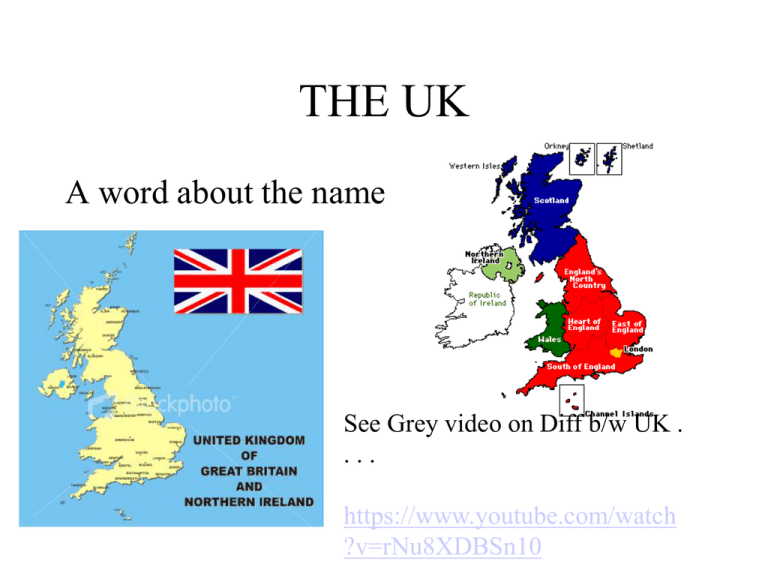
THE UK A word about the name See Grey video on Diff b/w UK . ... https://www.youtube.com/watch ?v=rNu8XDBSn10 British Political History https://www.youtube.com/watch?v=74SAgFG hjcc The Iraq War European Debt crisis • A very European Break up https://www.youtube.com/watch?v=q5FT47 kLZfs • A very European Christmas • https://www.youtube.com/watch?v=hvayG8 DiUXc Key Feature of the Constitution The regime is a ______________ democracy Which one? SO . . . _________ are held, citizens vote for a m______________ of ________________, and the _____________ minister will be the one who “holds the c_______________ of parliament”.. In the UK, usually that has meant the PM will be the leader of the party with a ________________ in parliament. The ________ will formally ask him (or her) to form the new government But if no party has a majority , you get a hung parliament 2010 election/electoral system explained in these videos https://www.youtube.com/watch?v=ZB4GqvzM6cM http://www.youtube.com/watch?v=zS5tyfPztlY http://www.youtube.com/watch?v=wJA02BOggWs Sovereignty, Authority and Power: Key Features of the Constitution Division of Governmental Authority Structural separation of authority Geographic Separation of Authority Geographically: ________– a state that is governed constitutionally as one single unit. The political power of government in such states may well be transferred to lower levels, to regionally or locally elected assemblies, governors and mayors (“devolved government”) but the central government retains the principal right to recall such delegated power. Structurally: ___________powers; PM not directly elected; government responsible to parliament Tony Blair's "Devolution within the UK" agenda Evidence of decentralization . . . . Part of 1997 election campaign was devolution of legislative powers to regionally elected assemblies September, 1997 referendums in Scotland and Wales approve (more popular in Scotland and give power to tax and more primary authority to make law) May, 1999 Scotland and Wales elected MPs using system of proportional representation— Powers to make legislation in certain areas have been 'devolved'. . . . However, power in many other areas, such as defense and foreign affairs (known as 'reserved' matters), still resides with the House of Commons. . http://www.youtube.com/watch?v=hl0GknNmNvc http://dictionary.ref erence.com/browse /sassenach Other Devolved areas: • North Irish Assembly Good Friday Peace Accord established a regional assembly for NI • approved in a referendum by a large majority of Catholics and a small majority of Protestants • 2002 Blair suspends the Catholic/Protestant assembly and imposes direct rule due to evidence Sinn Fein (the Catholic paramilitary group associated with the IRA) had targets for political violence (that’s what it means to be devolved) • May 2007 reinstated it (and that, my dears, is devolved vs federal) Other Devolved Areas: London Mayor • First: “Red Ken” • Congestion Charge Livingstone sits beside Jesse Jackson at an Anti-Apartheid rally in 1985 The Mayor has detailed steps to boost locally generated energy to cut carbon emissions, create green collar jobs and save money off fuel bills. Mayor of London, Boris Johnson http://www.london.gov.uk/ Referendum • Course description: http://apcentral.collegeboard.com/apc/publi c/repository/ap-govt-politics-coursedescription.pdf Head of State OCT. 17, 1957 With President Dwight D. Eisenhower JULY 7, 1976 With President Gerald R. Ford MAY 15, 1991 With President George Bush President Dwight D. Eisenhower and the queen at the White House in 1957. President Gerald Ford and his wife, Betty, escorted the queen to a White House state dinner in July 1976. Queen Elizabeth with President Ronald Reagan, Prime Minister Margaret Thatcher and West German Chancellor Helmut Kohl at Buckingham Palace in June 1984. Queen Elizabeth with former Prime Minister Edward Heath, President Richard Nixon and his wife, Pat, at Chequers, the country home of the prime minister, in 1970. Photo: Associated President Obama became the 11th president to meet Queen Elizabeth II when he and the first lady, Michelle Obama, visited Buckingham Palace on Wednesday. The queen and her husband, Prince Philip, the Duke of Edinburgh, hosted the Obamas the day before the Group of 20 summit. In addition to the presidents in the following pictures, the queen also met with Jimmy Carter, Lyndon B. Johnson and John F . Kennedy. A White-Tie Dinner for Queen’s White House Visit May 8, 2007 Presidents come and go, but for more than half a century, the queen has always been the queen. So it was perhaps no surprise that Washington went a little gaga on Monday, as Queen Elizabeth II and her husband, Prince Philip, the Duke of Edinburgh, began an official two-day visit to the capitalIt was a day for pomp and circumstance — a military color guard, a fife and drum band in white wigs, red jackets and tricornered hats — punctuated by a presidential slip of the tongue that lightened the moment during Mr. Bush’s welcoming remarks. Mr. Bush reminded the 81-year-old queen that she had already dined with 10 American presidents. “You helped our nation celebrate its bicentennial in 17 —— ” he went on, stopping to correct himself before 1776 could slip out. The crowd erupted in laughter, and the president and the queen turned to each other for a long, silent gaze. Then, Mr. Bush turned back to the crowd with an explanation. “She gave me a look,” he said, “that only a mother could give a child.” Mr. Bush had been the recipient of such a look once before in the queen’s presence — from his own mother, back in 1991, when the first President and Mrs. Bush played host to their own state dinner for the queen. By several different accounts, including Mr. Bush’s own, Barbara Bush told the queen that she had seated her son far away from Her Majesty, for fear he might make a wisecrack. Then, to his mother’s horror, he did, telling the queen that he was his family’s black sheep and asking, “Who’s yours?” The queen, apparently not amused, replied tartly, “None of your business.” The Queen, as Head of the Church of England and 'Defender of the Faith', with Church leaders, including the Archbishop of Canterbury. State Opening of Parliament: The Queen arriving at Parliament State Opening and the Yeoman of the Guard on Sovereign's staircase Gowns and Crowns http://www.youtube.com/watch?v=LRhWZ9RNn2s 2014https://www.youtube.com/watch?v=_xfhx5HH5_M Sovereignty, Authority and Power: Features of the Constitution Remember: “Constitutions define both the role and constituent parts of a government and the limits and obligations of government with respect to the rights of citizens” The British Constitution according to BBC: Lots of ingredients thrown together with a great deal of enthusiasm and then grated, squashed and drizzled over the years. But you won't be able to find the recipe in one easy-to-read volume available at your local supermarket. The famously unwritten constitution is made up different laws, customs and conventions, most of which have actually been written down It is held together by Parliament which, in theory at least, has the power to repeal any law it likes “Parliamentary Sovereignty” http://news.bbc.co.uk/1/hi/uk_politics/vote_2005/issues/4372135.stm Parliamentary Sovereignty A constitutional principle of government (principally in Britain) by which the legislature reserves the power to make or overturn any law without recourse by the executive, judiciary or the monarchy; only parliament can nullify or overturn legislation approved by parliament and parliament can force the cabinet or the government to resign by a vote of no-confidence "It is often said that it would be unconstitutional for the United Kingdom Parliament to do certain things, meaning that the moral, political and other reasons against doing them are so strong that most people would regard it as highly improper if Parliament did these things. But that does not mean that it is beyond the power of Parliament to do such things. If Parliament chose to do any of them the courts would not hold the Act of Parliament invalid." Lord Reid in Madzimbamuto v. Lardner-Burke [1969] 1 AC 645: So what is Parliament https://www.youtube.com/watch?v =RAMbIz3Y2JA&list=PLj3mInRJ qIembDRZ2kdbf6oPbjkqNsPyb Most important element of a Parliamentary System in which, by definition __________ is sovereign, is C________ Responsibility The majority party (or a coalition) in __________________ both selects and can remove PM and cabinet Or. . . The “government” has to retain the ________ of parliament Majority party voters Minority party / Parliament Prime minister & cabinet QUESTION HOUR: part of the Confidence Reln Associated Press Tony Blair and Gordon Brown, the Chancellor of the Exchequer, in 2003. Mr. Brown is Mr. Blair’s most likely successor as prime minister. Lexington: Who isn’t coming for dinner A bit of cross-party parliamentary civility might go a long way in America’s divided polity Economist: Aug 13th 2011 | from the print edition (SEE IMAGE) A BRITON in America notices something about comparative politics. Britain’s House of Commons reeks of conflict. The rival parties glare at one another from opposite benches. Debates are barbed and sometimes vicious—especially during the gladiatorial spectacle of prime minister’s questions. America’s Congress is different. Members of the House of Representatives sit shoulder-to-shoulder in the shape of a horseshoe. Debates, such as they are, are marked by an exaggerated decorum. The casual observer might easily conclude that America has the more consensual form of politics and Britain the more adversarial. As the bitter fights that have scarred the first half of Barack Obama’s presidency show, nothing could be further from the truth. Compared with the total war that is American politics, the British version is sport (amateur sport at that: the $1 billion that Mr Obama is said to be seeking for his re-election campaign would pay for an entire British general election 20 times over). http://www.economist.com/node/21525911 The Speaker is the “Debate Moderator” who presides over and facilitates debates. The Prime Minister is the lead debater of the Majority team (“the Government”) against the Minority team (“the Opposition”) Explained: http://news.bbc.co.uk/2/hi/uk_news/politics/7518212.stm See also: https://www.youtube.com/watch?v=QnKKPwEX_ac CHANGES TO THE CONSTITUION • (1) __________ terms: see Cameron defends change over election vote rules: http://news.bbc.co.uk/2/hi/uk_news/politics/8681624.stm • (2) __________ of _____________ reform Royal Rules Changed: http://www.bbc.c om/news/uk15492607 the Human Rights Act. This gave people living in the United Kingdom the right to enforce the European Convention on Human Rights in UK courts. It has had a dramatic effect on public bodies and on political debate. The Human Rights Act is not quite a written constitution, but to keep up the Jamie Oliver image it may only be short scooter ride away from the full monty. What the HR Act says http://www.equalityhumanrights.com/human-rights/what-arehuman-rights/the-human-rights-act/ http://news.bbc.co.uk/2/hi/uk_news/946400.stm Constitutional Change . . . . Erosion of _________ ____________ http://supremecourt.uk/about/introductory-film.html Can the UKSC overrule the UK Parliament? No it cannot. Unlike some Supreme Courts in other parts of the world, the UK Supreme Court does not have the power to ‘strike down’ legislation passed by the UK Parliament. It is not the Court’s role to formulate public policy, but to interpret law and develop it where necessary, through well-established processes and methods of reasoning. However, the Supreme Court must give effect to directly applicable European Union law, and interpret domestic law so far as possible consistently with European Union law. It must also give effect to the rights contained in the European Convention on Human Rights. Does it create Judicial Review? Mr Straw, who as home secretary introduced the Human Rights Act into British law in 1998, said that provisions in the legislation made clear that the final decisions on what the law should be were for MPs to make, not the courts. "We anticipated a situation where the senior courts of the land may decide that a provision in an act of parliament was incompatible with the human rights act," he told Today. "The final say on whether that act should remain in force was not given to the courts but given to parliament. "Nobody - and that includes senior judges - wanted a situation where suddenly we had made a supreme court supreme over parliament, rather than having a system which is fundamental to our system of democracy, having parliament as the ultimate arbiter on behalf of the British people." ... Mr Straw said: "It would much better if we could simply live in a society where such threats didn't exist and we could deal with all threats in society through the normal court system. "Very sadly, we are not able to do so, and it is for that reason that parliament and it is ultimately a matter for parliament - judged that these powers were appropriate and right." 2. Describe a major function of the Supreme Court of the United Kingdom. Explain one reason for the establishment of the Supreme Court of the United Kingdom. Explain how membership in the European Union affects the judicial system in Great Britain. 3 points One point is earned for a description of a major function of the Supreme Court of the United Kingdom. Major functions of the Supreme Court of the United Kingdom include the following: • Final court of appeals • • Protects human/civil rights and liberties • Ruling on devolution disputes • Ruling on incompatibility of UK law with European Union (EU) law • Check on legislative-executive power Note: The Supreme Court of the United Kingdom exercises judicial review in limited circumstances. It does not have the power to declare a law unconstitutional.* One point is earned for an explanation of a reason for the establishment of the Supreme Court of the United Kingdom. Reasons for the establishment of the Supreme Court of the United Kingdom include the following: • Enhance legitimacy • Improve transparency by clarifying the role of the court • Separate judicial authority from the House of Lords • Achieve consistency with international norms • Resolve devolution disputes • Achieve Blair-led Labour Party goal One point is earned for a correct explanation of how membership in the EU affects the judicial system in Great Britain. Acceptable explanations include the following: • European Court of Justice (ECJ) is highest legal authority. • EU law supersedes UK law in judicial decision making. • Loss of sovereignty. • More laws to adjudicate. Erosion of Parliamentary sovereignty? devolution of power to regional assemblies in Scotland (Scottish Parliament), Wales (Welsh Assembly) and Northern Ireland (Northern Ireland Assembly). Although, since the UK is a unitary system, these assemblies are not sovereign, and the assemblies can be suspended, as has happened with the Northern Ireland Assembly. Still, such a decision would (currently) be highly unpopular with the electorate in both places. Creation of Mayor of London EU law trumps British law, laws must comply with decisions of EU Ct of Justice the Human Rights Act 1998 incorporates the European Convention on human rights, and the European Court of Justice (ECJ) asserts the power to exercise judicial review over UK law increasing use of referendums. Supreme Court is separate Key characteristic: separate offices for • Head of _________: the chief public representative of a country, and • Head of ___________(the title of the person who manages the day-to-day activities of the government.) Neither of whom are elected directly by the people . . . . 2010 Elections The results: http://news.bbc.co.uk/2/shared/election2010/result s/ Results of coalition . . . AV video: http://www.bbc.co.uk/news/uk-politics13276178 Is your cat confused by av? https://www.youtube.com/watch?v=HiHuiDD_oTk BBC Q&A: Gay marriage June 2013 Peers have backed plans to legalise gay marriage in England and Wales, including by those religious organisations which want to offer it. So what are the issues surrounding the government's plans? Where do the coalition parties stand on the issue? Plans to legalise same-sex marriage have divided the Conservative Party, and more Tory MPs voted against the bill at second reading in February than voted for it. Prime Minister David Cameron has said he believes same-sex marriages should be allowed in churches - but only if there is a "100%" guarantee that no church, synagogue or mosque would be forced to hold one against their wishes. Lib Dem leader Nick Clegg said the legislation was a triumph for his party, which has championed the plans. Most Labour MPs, including Ed Miliband, also support the move. Becoming the PM Read: http://thoughtundermined.com/2011/06/08/keyword-post-how-is-the-prime-minister-chosen Effective Commander in Chief Tony Blair meeting British troops in the port of Umm Qasr, Iraq, in 2003. Blair Hands Over Leadership of Labor Party :”Elite Requritment” http://www.thefreedictionary.com/recrui tment LONDON, June 24 — Long heralded and often rancorous, Britains’s transfer of power from _________ ____________ entered its final countdown on Sunday when the governing Labor Party anointed ___________ ______________ as his successor. The ceremonial crowning of Mr. Brown as the only candidate in a seven-week contest for the party leadership opens the way for a defining moment in his long rivalry with Mr. Blair, when the two men are to pay separate visits to Queen Elizabeth II on Wednesday, Mr. Blair to quit as prime minister and Mr. Brown to take over. June 27, 2007 Gordon Brown to Take Over From Blair in Britain Or . . . For the current British Prime Minister David Cameron welcomes Deputy Prime Minister Nick Clegg (R) to Downing Street for their first day of coalition government on 12 May 2010 in London . Published: Wednesday 12 May 2010 Updated: Wednesday 12 May 2010 After five days of negotiations, Cameron enters 10 Downing Street as Britain’s new prime minister in a full coalition government with Lib Dem leader Nick Clegg as his deputy. http://news.bbc.co.uk/2/hi/uk_news/politics/election_2010/8675265.stm Britain's Labour Party taps Ed Miliband as new leader London, England (CNN) -- Britain's Labour Party on Saturday announced Ed Miliband as its new leader Saturday, four months after Prime Minister Gordon Brown resigned from the post when his party lost the election. Several rounds of voting were required to determine Saturday's winner, since no one received more than 50 percent support in the early ballots. Ed Miliband and his brother, David, who was also in the running, were locked in a battle for the top spot for until the very end. The final numbers gave Ed 50.6 percent of the votes and David 49.35 percent. More Things about Parliament • front and back bench • What’s a government? • What’s a shadow government? Parliamentary Systems feature Shadow Cabinets who are always monitoring and scrutinizing the Government Cabinet. Another reason why Parliamentary Systems are less prone to Corruption than Presidential Systems. http://www.bbc.co.uk/news/ukpolitics-11494915 More . . . Things about Parliament Unequal ___cameralism: the ____________ of __________ can delay legislation (though not a r_________ bill) by rejecting it, so it has to go back to the H of C and go through the process again Benches in the House of Commons Chamber are coloured green. In contrast, the House of Lords is decorated in red. Britain Wonders if More Elections Equal More Democracy PEER GROUP The House of Lords rejected calls to replace its life peers with ones elected to a single 15year term. http://www.bbc.co.uk/n ews/uk-politics17826183 Conceptual Analysis: We suggest that you spend approximately 30 minutes on question 6. (a) Define bicameralism (b) Identify one of the six countries covered in the AP Comparative Government and Politics course that has a bicameral national legislature. (c) Explain why a federal democracy is likely to have a bicameral national legislature. (d) Provide one other reason for a bicameral national legislature. (e) Describe two implications of federalism for the policy-making process. US review . . . What does Madison say in the fed papers is the purpose? independent courts: • have authority to protect people against improper implementation of laws and regulations . . . but can not overrule parliament (no judicial review—except maybe as a result of Human Rights Act) • common law system (as opposed to civil law) based on precedents Political Culture See handout comparing attitudes social capital is the expected collective or economic benefits derived from the preferential treatment and cooperation between individuals and groups. Although different social sciences emphasize different aspects of social capital, they tend to share the core idea "that social networks have value". Just as a screwdriver (physical capital) or a university education (cultural capital or human capital) can increase productivity (both individual and collective), so do social contacts affect the productivity of individuals and groups Social capital refers to the institutions, relationships, and norms that shape the quality and quantity of a society's social interactions. Increasing evidence shows that social cohesion is critical for societies to prosper economically and for development to be sustainable. Social capital is not just the sum of the institutions which underpin a society – it is the glue that holds them together http://web.worldbank.org/WBSITE/EXTERNAL/TOPICS/EXTSOCI DEVELOPMENT/EXTTSOCIALCAPITAL/0,,contentMDK:201852 Political Participation Elections . . . . MP, Referendum, local, and EP http://www.idea.int/vt/countryview.cfm?CountryCode=GB http://www.ukpolitical.info/Turnout45.htm Remember video about how to contact parliament Think about a freedom house rating of 1 and 1 Freedom in the world 2015 https://freedomhouse.org/report-types/freedomworld#.VNpP1rd0xkg Policy White papers are documents produced by the Government setting out details of future policy on a particular subject. A White Paper will often be the basis for a Bill to be put before Parliament. The White Paper allows the Government an opportunity to gather feedback before it formally presents the policies as a Bill. Welfare state Even under Thatcher and Major, Britain experienced real growth in both social services and health care provisions Austerity Economic policy aimed at reducing a government's deficit (or borrowing). Austerity can be achieved through increases in government revenues - primarily via tax rises - and/or a reduction in government spending or future spending commitments. A welfare state is a "concept of government in which the state plays a key role in the protection and promotion of the economic and social well-being of its citizens % of GDP in social expenditures in OECD states, 2013 Austerity current issues George Osborne warns of more cuts and austerity in 'year of hard tru Chancellor targets £25bn of savings in welfare budget, and says he will st with housing benefit for under-25s http://www.theguardian.com/politics/2014/jan/06/george-osborne-britainausterity Dec 2014—see cuts http://www.newyorker.com/news/johncassidy/u-k-s-mr-austerity-double s Facing Austerity, Britain Unveils Welfare Cuts http://www.nytimes.com/2010/11/12/world/europe/12b ritain.html?_r=1&ref=world U.K.'s Conservatives Seek Further Austerity Measures http://online.wsj.com/article/SB10000872396390443615 804578042043634323094.html 2012 British Students Protest Tuition Fee Increase http://www.npr.org/templates/story/story.php?storyId=13122559 9 Thousands of British Students Protest Tuition Hikes British students protest in central London against government plans to triple tuition fees, Thursday, Dec. 9, 2010. Police with riot shields held off angry student protesters marching to London's Parliament Square on Thursday as lawmakers debated a contro Policy: London Tuition fees and protest Yobs stormed Tory party HQ yesterday as a student 2010 protest: demo erupted in violence Video: http://www.bbc.co.uk/news/education-11726822 2011 http://www.bbc.co.uk/news/education-15646709 2012 protest pictures http://www.telegraph.co.uk/education/educationpicturegalleries/9693957/Students-protestagainst-tuition-fee-hike-debt-and-youth-unemployment.html#?frame=2405568 White Paper http://www.bbc.co.uk/news/education-13939525 Q hour: http://www.bbc.co.uk/news/uk-politics-11725444 look Q hour is not just PM BBC 22 jan 2015 What is quantitative easing? The European Central Bank has announced action aimed at stimulating the troubled eurozone economy in the face of deflation and recession. http://www.bbc.com/news /business-15198789 This cartoon by Dave Brown from The Independent combines two UK news stories: the launch of the Give a Child a Home campaign, which calls on more members of the public to come forward as adopters and foster parents, and David Cameron's ongoing battle with Eurosceptic Conservative MPs. In the cartoon, UK prime minister David Cameron is depicted as a nanny pushing a pram full of crying babies, who are waving anti-EU placards. Cameron comments, "The sooner someone adopts these bastards the better!" A bodyguard helped Nick Griffin, center, the British National Party leader, flee egg-tossing protester in London on Tuesday The British National Party opposes what Mr. Griffin calls the “creeping Islamification” of Britain, supports voluntary repatriation of immigrants and wants to take Britain out of the European Union and NATO. Analysts say the British National Party has tapped into the frustration of working-class voters, particularly in the gritty rust-belt cities of northwestern England, who are disillusioned with Labor. In 1997 he helped write a pamphlet titled “Who are the Mindbenders?,” in which he asked whether there was a significant Zionist influence over the British news media. He was found guilty of distributing material likely to incite racial hatred and given a two-year suspended prison sentence. While European Parliament elections are fought under a system that rewards parties according to the votes they receive, the British Parliament is chosen by a method that puts small parties at a disadvantage. Mr. Griffin denies that the British National Party is racist, though he admits that it operates a “restrictive membership policy” and that it is therefore not open to all races or ethnicities Muslims’ Veils Test Limits of Britain’s Tolerance Acorn . . . Institutions . . . . Students should also explore how interest groups exercise political influence and be able to apply the concepts of corporatism and pluralism. Corporatism Pluralism •Single “peak” assoc. reps a societal interest •Compulsory/universal membership •Central organization •Groups systematically involved in making and implementing policy •State grants “favored status” •Multiple groups can rep. a single interest •Non-compulsory membership •Decentralized organization •Clear sep IG/govt •In competition among groups for policy not all groups equal Since the coalition government of Conservatives and Liberal Democrats was formed in May 2010, over 80 of such public bodies funded by government have been abolished under Conservative plans to reduce the size of the public sector, as a route to reducing the overall budget deficit. However about a thousand still remain. A guide to quangos being culled http://www.guardian.co.uk/society/ 2010/sep/29/guide-to-quangos More details about parliament for the inquiring mind . . . .: http://www.parliament.uk/about/ho w/laws/passagebill/commons/coms-considerationof-amendments/ Stages a bill goes through: http://news.bbc.co.uk/democracyliv e/hi/guides/newsid_166000/166358 .stm Executives: PM --single most imp. player at apex of unitary govt. with powers not limited by courts or a written constitution: what are his Powers? Vote of conf; can introduce leg, majority in parl and party discipline (3-line whip) , calls elections, sits in P But his power is not without limit: Rule of law Legitimacy Confidence relation Cabinet responsibility Practical reasons Fixed term elections could be kicked out Globalization Question hour Back bench and rivals dead hand of the past FUNCTIONS OF POLITICAL PARTIES Democracies: Nominate Candidates (compare to US with primaries—no one else has this mechanism which effectively weakens one of the most imp function of pol parties) , Run campaigns (compare to US’s "candidate centered campaigns"), get voters voting (register, GOTV, Give cues to voters), act as linkage institution, articulate interests, aggregate interests, act as a modifying influence on government, Provide a "loyal opposition", political socialization, policy formation, monitor elected representatives Who sits where in the Commons The change of government means many MPs have changed where they sit in the House of Commons. The Conservatives are back on the government benches for the first time in 13 years - but now they have been joined by the Liberal Democrats. Labour are on the opposition benches. Members of the coalition cabinet are sitting on the government front bench - including Prime Minister David Cameron and Deputy Prime Minister Nick Clegg sitting side-by-side. The remaining Lib Dems are sitting in a block on the government side - opposite where they used to sit. Cameron's government: A guide to who's who
